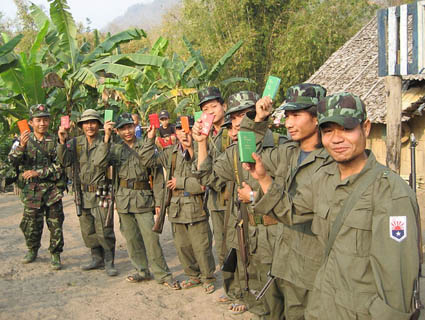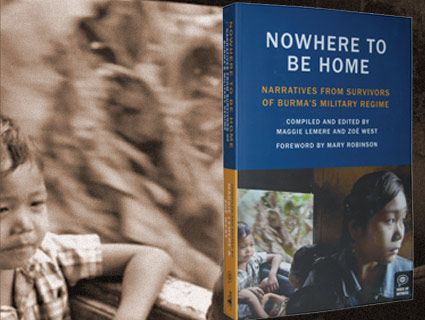
Karen rebels in 2007<a href="http://www.flickr.com/photos/rangerholton/384104831/in/photostream/">ChuckHolton</a>/Flickr
Crazy news coming out of Burma yesterday: The Karen National Union, an ethnic organization that’s been waging an armed insurrection against the Burmese government since nearly the moment the country became independent in 1948, has signed a ceasefire.
This wasn’t some wee little skirmish. When the rebellion started more than 60 years ago, the Karen, an ethnic minority that had been favored as police officers and soldiers by the colonizers, used their British training and British guns to nearly take over the country. They’ve been fairly steadily beat back to the eastern jungles since then. Lately, this fight has been a few thousand soldiers from one of the poorest populations on the planet versus an army of hundreds of thousands that spends billions procuring weapons.
But however small the KNU’s army, the ramifications of this ongoing battle have been huge: More than 500,000 internally displaced people living without villages, infrastructure, or any kind of security whatsoever. Hundreds of thousands of refugees have fled to neighboring countries or been resettled by the UN as far away as the United States. Countless civilians have been raped and murdered at the hands of the Burmese army.
So it is a great big deal if this ceasefire sticks. Truces between the Karen and the Burmese armies have been reached before and then broken down. If the Burmese army is really going to stop killing people and setting villages on fire, this ceasefire is going to make a real difference to a lot of people. If only the agreement had included sending a group of experts in to clear out all the land mines both sides have been laying for decades.
This war has been a huge part of the Karen’s culture, as is their refusal to stop fighting it. “For us surrender is out of the question” is the first tenet of the KNU revolution, and it’s printed everywhere, from T-shirts to tattoos. I imagined the Karen refugees I lived with in Thailand a few years back would have mixed feelings about this news. I tried to call every one in my phone this morning, but they all work long hours or two jobs in places like meat-packing factories to survive in their new homes. (Many have moved to America, Australia, England, or Norway.) The only thing on any of their Facebook pages about the matter was other refugees asking them what they thought about it.
The comments beneath the article about the ceasefire on the website of the Irrawaddy, the exile newspaper read religiously by refugees and revolutionaries, are indeed mixed. One commenter accuses the KNU of wanting to profit from joining with the Burmese government in plundering Karen State’s resources, and warns that only the enemy will benefit from this agreement. But another says, huzzah, it’s about time for peace. And now the Kachin Independence Army should sign a ceasefire, too.
Right—the KIA. This group also has been fighting for the autonomy and protection of their people for years. Reports (PDF) about atrocities have recently been pouring out of Kachin State on the Chinese border. (The Kachin News group’s top story today, for example, is “Burma army kills two unarmed Kachin women.”)
Hopefully peace will come to that region, too. And hopefully this tentative peace with the Karen—Peace in Karen State! Something that hardly any Karen person living has experienced or can remember!—will hold. Not to mention the Burmese government’s recent ceasefires with the Shan State Army-South, the United Wa State Army, and various other ethnic factions. “We have been fighting for 60 years,” one of the Karen delegates at the ceasefire said, “and one meeting alone will not end it.” It’s a start, at least.
















